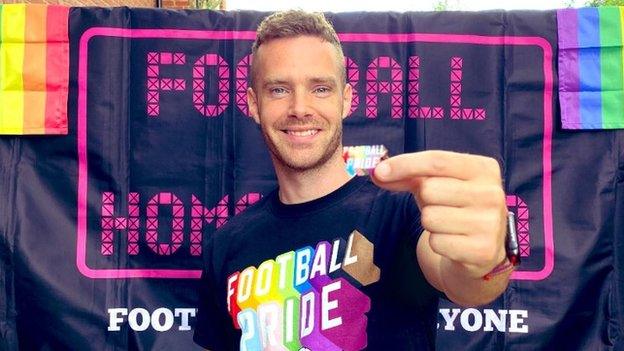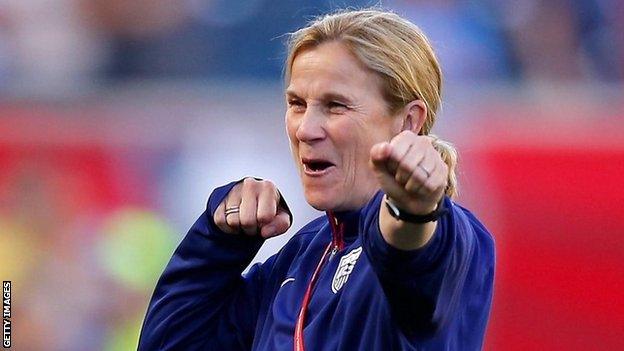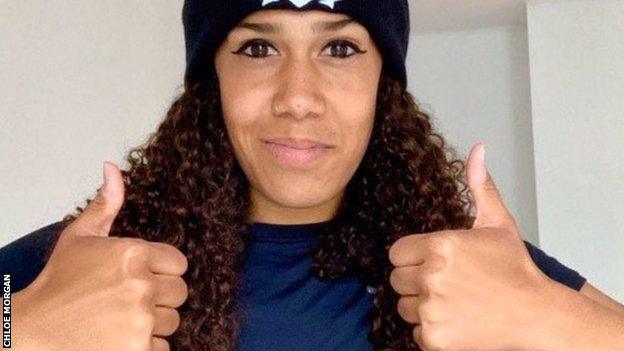Football Pride: 'This can be the spark that gets more people into the game'
- Published

Samuel Timms is one of the organisers of Saturday's Football Pride event
"Football's my DNA. I've grown up with it - it's like my right arm!"
Samuel Timms is a keen amateur footballer, an Aston Villa fan and one of the organisers of Football Pride.
The online event, which takes place on Saturday, is part of a wider Football v Homophobia campaign and will bring together clubs, players, coaches and supporters from around the world for a virtual get-together celebrating inclusive football culture.
"I think it took a few gin and tonics and Zoom calls to organise," Timms jokes. "But it's amazing to know how big a net we have with visible LGBT people and allies. That shows where we're getting to in football."
As Timms knows, it has not always been that way.

As a gay football fan in the 1970s, Darryl Telles remembers how different things used to be.
"I was at a Nottingham Forest game when fans were homophobically singing about Brian Clough and Peter Taylor having an affair," he says.
"It was a joke, calling them gay, but it really isolated me because my friends were singing it too.
"It was one of my first experiences of football, and it was a homophobic one. That was a real shocker to me as a 14-year-old, so I hid my sexuality."
But it's not just on the terraces that football people have felt the need to hide their sexuality.
The story of Justin Fashanu - the first male English professional footballer to come out as gay while still playing - is well known. Other gay footballers - such as former Aston Villa midfielder Thomas Hitzlsperger - chose to come out after they retired.
Even in the women's game, which is widely seen as more accepting, it has not always been easy for people to be their authentic selves.

Former USA boss Jill Ellis has been linked with the England job
Jill Ellis coached the USA women's national team to back-to-back World Cup victories in 2015 and 2019.
She is now open about her sexuality but that has not always been the case.
"It's so different now," she says. "When I was coaching at colleges, it wasn't something that was openly discussed.
"You're trying to recruit players and, at times, it wasn't viewed as a positive thing. Other coaches could use your sexuality against you in terms of being negative, so I was very much a private person in terms of my private life."
Looking back, Ellis describes the moment she came out to her college team - on the field, with her daughter in her arms - as liberating, and something she hopes others can take strength from.

Plenty of other LGBTQ+ people in football are using their platform to show the game is somewhere everyone belongs.
In 2017, Ryan Atkin became England's first out gay male referee at a professional level.
"It was a whirlwind," he says. "First and foremost, I'm a referee - but if I'm going to talk about equality in football, I'm going to mention that I'm a member of the LGBT family.
"It was an opportunity for me, being comfortable with where I was in football and in my own personal life, to come out publicly and try to campaign for greater respect and understanding within the game."
Crystal Palace goalkeeper Chloe Morgan is also using her position to encourage other LGBTQ+ people to get involved with the sport.
"I never received any prejudice of any sort," says Morgan, who will be involved with one of Saturday's Football Pride seminars.
"Football became a sort of safe haven, because I knew there were other members of the LGBTQ community there to rely on or have my back if anything did happen.
"I came out to my parents at 18, and since then I've always felt supported in the game - not just by my own team, but by the fans as well."

Chloe Morgan joined Crystal Palace from Tottenham earlier this month
That is something Luke Tuffs, who manages Isthmian League side Ashford Town, recognises.
"I've been nothing but looked after," he says. "I came out to my old first team when I was 16. I looked about 12, so I was a baby to them, and they looked after me.
"I think one person said something, and the boys went at them. They protected me and from there, everyone in football knew I was gay so I've never had a problem."

Change is happening. The work of LGBTQ+ supporters' groups will be spotlighted at Saturday's Football Pride, alongside an ever-growing number of inclusive clubs.
Sammy Walker knows what a difference those inclusive teams can make.
"I was scouted by Wycombe and Watford," she says. "I dreamed of playing professionally.
"But I knew it would be difficult to be a professional player and transgender. So I lost my passion for playing out of fear, I think."
After transitioning and spending time away from the game, Walker ended up playing again - firstly with Soho FC and latterly Bristol Panthers.
"I missed being part of a team, the camaraderie, the team spirit. So finding these clubs and having football back in my life was a relief like you wouldn't believe."
It's that sense of being able to belong in the beautiful game without hiding who you are that is driving Timms and the other organisers of Football Pride.
"The power football has is great," Timms says. "Hopefully Football Pride can be the spark that gets even more people into it."
Find out more about Football Pride here, external
Listen to the BBC's LGBT Sport Podcast here